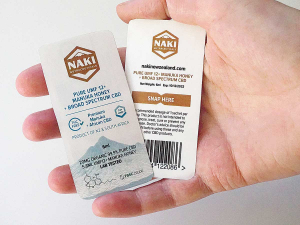Naki unveils the world’s most expensive manuka honey
Naki Honey, a New Zealand manuka apiary company, has crafted what is believed to be the world's most expensive honey.
 The manuka honey and cannabidiol (CBD) blended nutraceutical is aimed at the billion-dollar export market.
The manuka honey and cannabidiol (CBD) blended nutraceutical is aimed at the billion-dollar export market.
In what is described as a first for the country, Taranaki-based Naki New Zealand has developed a mānuka honey and cannabidiol (CBD) blended nutraceutical aimed at the billion-dollar export market for CBD edibles.
Cannabidiol is a substance found in cannabis that has potential therapeutic value with little-to-no psychoactive properties. Proponents claim CBDs can assist with alleviating a wide range of conditions – including anxiety, pain, insomnia and inflammation.
The global market for CBD-infused edibles is set to grow by 25% annually over the next seven years and is estimated to be worth over $8b in Europe alone.
Naki New Zealand will launch a new single-serve mānuka honey product blended with a CBD extract. The company claims to have existing interest for the product in six of their key US and European markets.
Naki NZ global market manager Derek Burchell-Burger says there are distinct differences in New Zealand’s mānuka honey export markets.
“For the Chinese, mānuka honey is among the most expensive and carries a premium, mainly for the associated social status,” he says. “The European market is noticeably different, with the product is more likely to be sold through a naturopathic practitioner channel.”
Burchell-Burger claims European consumers are more educated about the medicinal qualities of mānuka honey and recognises how its sugars enter directly into the bloodstream.
“Leading to questions about antibacterial methylglyoxal levels, anti-viral, immuno-potentiating abilities and, of course, the UMF grade.”
Meanwhile, he says the Asian market model centres around established distribution networks, which push the mānuka message – with local celebrities and influencers helping to endorse the product.
“By contrast, in Europe and the US, the selling pathway is more hands-on at a retail level, with one-on-one conversations with pharmacies, supermarkets and wellness outlets.”
The new Naki Honey Mānuka CBD blend will be available as a single-serve, snap pack product (familiar for the delivery of sauces and ketchups) and at $5.50 - $6.00 – a similar cost to a takeaway coffee.
Burchell-Burger says the company has faced several challenges that have hampered development of the new product.
“The current regulatory environment in New Zealand is not conducive to the development of CBD edibles, so honey has to be shipped to South Africa where it is blended with a broad-spectrum CBD extract,” he explains. “This is the first time that Naki New Zealand has not produced a honey product locally, but it was necessary in order to expedite entry to a rapidly evolving market.”
Burchell-Burger believes the restrictions have reduced New Zealand’s potential export earnings.
“Regardless of the outcome of the referendum (legalising marijuana) there is a huge export opportunity for the development of other CBD edibles,” he claims.
“The tight regulatory environment around CBD development in NZ also means we are coming to the party quite late.”
Global trade has been thrown into another bout of uncertainty following the overnight ruling by US Supreme Court, striking down President Donald Trump's decision to impose additional tariffs on trading partners.
Controls on the movement of fruit and vegetables in the Auckland suburb of Mt Roskill have been lifted.
Fonterra farmer shareholders and unit holders are in line for another payment in April.
Farmers are being encouraged to take a closer look at the refrigerants running inside their on-farm systems, as international and domestic pressure continues to build on high global warming potential (GWP) 400-series refrigerants.
As expected, Fonterra has lifted its 2025-26 forecast farmgate milk price mid-point to $9.50/kgMS.
Bovonic says a return on investment study has found its automated mastitis detection technology, QuadSense, is delivering financial, labour, and animal-health benefits on New Zealand dairy farms worth an estimated $29,547 per season.

OPINION: Here w go: the election date is set for November 7 and the politicians are out of the gate…
OPINION: ECan data was released a few days ago showing Canterbury farmers have made “giant strides on environmental performance”.